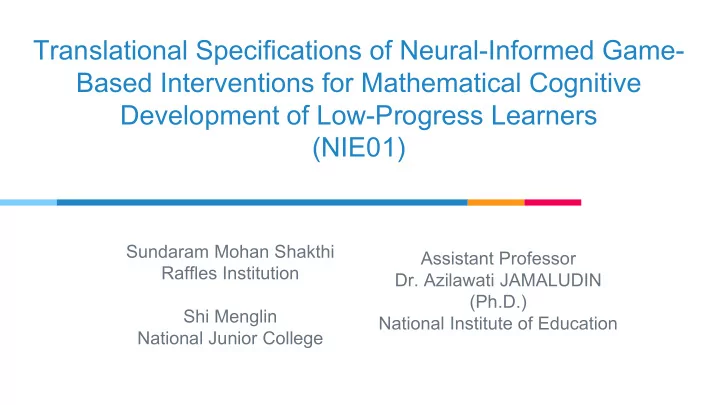

Translational Specifications of Neural-Informed Game- Based Interventions for Mathematical Cognitive Development of Low-Progress Learners (NIE01) Sundaram Mohan Shakthi Assistant Professor Raffles Institution Dr. Azilawati JAMALUDIN (Ph.D.) Shi Menglin National Institute of Education National Junior College
3-year project Primary school students who underperform in math Using games to improve their math ability 2
Determine the behavioral and lifestyle factors that affect the cognitive performance of Junior College students in mathematics 3
Table of Contents ▷ Reasons for embarking on project ▷ Methodology ▷ Results ▷ Implications 4
Why Is Mathematics Important? Country’s Country’s Economic GDP Strength Mathematics Performance ▷ DiCorrado, E., Kelly, K., & Wright, M. (2015). The Relationship Between Mathematical Performance and GDP per Capita . Retrieved Sept 8, 2018 from https://smartech.gatech.edu/handle/1853/54222 5
1,2,3… Numerosity Processing Visual Spatial Skills Mathematics Anxiety Speed ? ▷ Gurefe, N., & Bakalim, O. (2018). Mathematics Anxiety, Perceived Mathematics Self-efficacy and Learned Helplessness in Mathematics in Faculty of Education Students. International Online Journal of Educational Sciences,10 (3), 147-161. ▷ Lambert, K., & Spinath, B. (2017). Conservation Abilities, Visuospatial Skills, and Numerosity Processing Speed: Association With Math Achievement and Math Difficulties in Elementary School Children. Journal of 6 Learning Disabilities,51 (3), 223-235.
Methodology 7
30 JC students From 2 Singapore JC 16-18 years old 8
Behavioural Factors Sleeping Executive Habits Function Cognitive Working Inhibitory Flexibility Memory Control 9
Sleeping Habits 10
Executive Function (EF) Cognitive Flexibility 11
Executive Function (EF) ▷ Working Memory ▷ Digit Span ▷ Attentional Control ▷ Reaction Time 12
Working Memory --Picture n-back 13
Digit Span 14
Attentional Control --Eriksen Flanker Task 15
Reaction Time 16
Results 17
The Correlation Matrix Between Variables 18
Conclusion Mathematics Performance Cognitive Flexibility 19
Possible Implications More emphasis on cognitive flexibility More aerobics activities that improve cognitive flexibility Less drilling 20
Thank you!
22
How do we choose the sample? 23
Mix of males and females With varying math ability according to their grades for promotional examinations 24
Why do we choose behavioural factors? 25
FACTORS AFFECT STUDENT MATHEMATICS PERFORMANCE School-level 17% Classroom-level 14% Student-level 69% 26
Why do we choose these factors? Sleeping Habits 27
4 in 5 teens are sleep-deprived Only 20% of teenagers from top schools in Singapore are getting enough sleep Sleeping quality affects test performance 28
Why do we choose these factors? Executive Function 29
215 Preschool children in Singapore After controlling individual factors such as gender, age, ethnicity and socioeconomic status Executive functioning can be used to predict mathematics achievement 30
Why do we choose to use Pearson Correlation? 31
Measure strength of linear associations between 2 variables Value ranges from +1 to -1 P-value indicated statistical significance using statistical programme such as SPSS 32
Recommend
More recommend